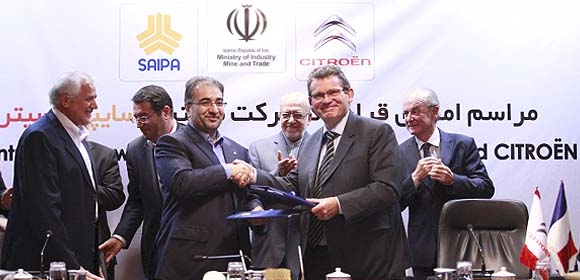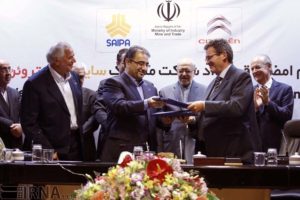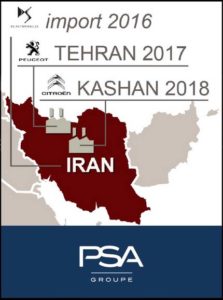During the course of the summer PSA Group signed a framework deal with Iranian counterpart SAIPA to produce and sell vehicles for its Citroën brand in the country. Under the agreement, to be finalized by the end of 2016, Citroën and its Iranian partner will invest 300 million euros over five years in manufacturing, research and development. The first of three planned new Citroën models will be launched in Iran in 2018.
PSA, which pulled out in 2011 under U.S. pressure, now faces stiffer competition from Chinese rivals that have grabbed more business in the intervening years – as well as western peers such as Renault flocking back with newer models.
“This agreement opens up a new chapter in our history of cooperation with Saipa,” PSA CEO Carlos Tavares said. “Our aim is to provide our Iranian customers with modern vehicles that meet the highest comfort, safety and technology standards.”
Iranian car registrations approached 1.6 million cars at their 2011 peak, with PSA claiming almost 30 percent of the market, before collapsing under the weight of sanctions.
The deal with Saipa, Citroën’s partner since 1966, follows a 400 million joint venture deal inked in May between Peugeot and state-owned Iran Khodro, with the proviso 40% of components must be sourced locally. The 50:50 joint venture will build a Tehran factory to produce vehicles on a platform IKCO will share to develop its own models, as well as assemble Peugeot’s 208, 2008 and 301 for local sale.
Saipa says its recent agreement to establish a 50:50 joint venture with Citroën, will see a major push on value-added localisation to achieve a 70% domestic component supply within two years.
The Iranian-Franco deal will see the joint venture include the whole value chain, from the design stage through to vehicle marketing, with manufacturing at the Kashan plant, which will be 50% owned by PSA Groupe.
The West and Iran have long been squaring off with the former suspicious the latter was looking to potentially enrich uranium for military use, but the deal struck in Geneva to allow greater energy oversight has led to a dramatic thaw in relations and the ending of sanctions.
“In the first year we will have at least 35% localization [with Citroën] and by two years we will increase it to 70%,” Saipa corporate business development, general manager, Ali Momeni, told just-auto from Tehran. “Iranian parts producers are used to producing parts in Iran. Now we can use this advantage and immediately increase localization for Citroën cars as well.
“Suppliers used to localise Peugeot parts 15-20 years ago, so we are ready to invest and supply in the Iranian market. The main concern of the government is we should not just give the market to foreign owners to just sell cars and parts,” added Momeni. “They should create value added in Iran.
The corporate business development general manager noted Saipa had some 80 Iranian suppliers, who were currently undergoing evaluation by Citroën, although he had no specific timetable for when that process would complete.




Please launch citron cars like 2cv , Dayne, ami8, in my country your business will be more because we are facing fuel high prices.